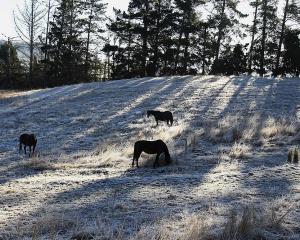Weather forecasting is an increasingly sophisticated science but because weather systems are constantly evolving any snapshot, taken in isolation, renders it inexact.
People intuitively know this, even those experienced in the outdoors, but "the call of the wild" can often lead to unforeseen decisions which countermand common sense.
More predictable than either the weather or the intentions of people setting out to explore the great outdoors - and we are in the midst of peak season for tramping, exploring, camping - is that search and rescue volunteers will experience their busiest months around this time of year.
There are more people out and about exploring the rugged and wild beauty that New Zealand offers to all-comers, residents and tourists alike, and it stands to reason there is the potential for more numerous mishaps and misadventures.
As if on cue, a log of New Zealand Land Search and Rescue (LandSAR) activities out of the Wanaka area is perfectly illustrative of this.
Over the past two weeks volunteers conducted four successful operations which, given less clement conditions or poorer decision making by various parties, could have led to unhappier outcomes.
On each of these occasions, in part due to the dedication and skill of LandSAR volunteers, people were rescued or found, but the margins between success and failure on such missions can be slim indeed.
The New Zealand wilderness can be a brutal and unforgiving place and figures just released for the numbers of police-led search and rescue operations in the Southern police district confirm this.
Last year the numbers of missions increased by 20% over 2009, with 237 operations.
The most common type of search was for missing trampers, mostly in the Te Anau and Wanaka areas.
About 250 people were rescued and 13 bodies retrieved compared to seven recovered in 2009.
The rescue season in the Otago region began more ominously last month with a death on the slopes of Mt Aspiring when an overseas climber fell, and the tragic drowning on Lake Wakatipu of two Queenstown-based foreign students caught on the lake in a kayak in adverse conditions.
With outdoor activities there will always be a degree of risk.
But these are heightened when those undertaking challenging trips fail to observe certain precautions.
Some overestimate their own physical fitness or capabilities and simultaneously underestimate the difficulty of the terrain they plan to traverse.
Such mismatches can have fatal consequences as can a tendency on the part of less experienced, or more foolhardy adventurers to play down the potential ferocity of the conditions.
Particularly at the southern end of the country, the weather can turn with a shocking suddenness and move between extremes - from summer highs to bitterly cold, rain-sodden fronts which carry with them the dangers of swollen rivers and hypothermia-inducing temperatures.
One basic precaution that some blithely forego, despite exhortations to comply, is the signing of intentions books at huts on tramping tracks, so that in the event of accidents, rescue teams have a fair chance of locating the individuals concerned.
LandSAR is a voluntary organisation and comprises around 2500 well-trained members across the country.
Without their dedication, familiarity with the outdoors, and skills, there would undoubtedly be a greater number of lives lost each year.
But their proper role is an emergency response team, rather than a routine back-country nannying agency.
The first rule of any outdoor activity is to adhere to a basic set of sound principles relating to terrain, weather, personal fitness and stated intentions.
When coupled with a necessarily heightened sense of self-reliance and practical common sense, the vast majority of activities will pass off safely and successfully.
New Zealand has magnificent land forms, mountains and valleys and unparalleled beauty in the flora and fauna with which they are adorned.
It has trails and tracks galore and countless opportunities for those with an outdoor bent to experience.
But with opportunities come obligations and responsibilities.
Be safe out there.







